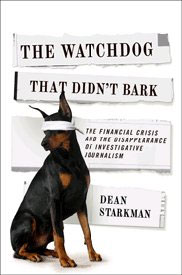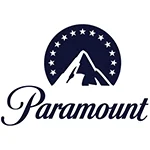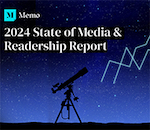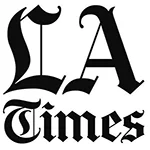Financial journalists failed to warn about the banking abuses that stalled the economy in 2008 and threatened ten million Americans with foreclosure, Dean Starkman of Columbia Journalism Review charges in The Watchdog That Didn’t Bark.
 Starkman makes a sweeping indictment of his fellow journalists, charging that in the critical years between 2004 and 2006, there was a lack of “investigative stories that directly confront the powerful institutions about basic business practices while those institutions were still powerful.”
Starkman makes a sweeping indictment of his fellow journalists, charging that in the critical years between 2004 and 2006, there was a lack of “investigative stories that directly confront the powerful institutions about basic business practices while those institutions were still powerful.”
Starkman asked leading financial media in 2009 to provide their best work during the period leading up to the meltdown.
The conclusion he reached was a “simple one,” says his article in the January/February Columbia Journalism Review: “The business press had done everything but take on the institutions that brought down the financial system.”
Subtitle of the book is The Financial Crisis and the Disappearance of Investigative Journalism.
This will be news to Investigative Reporters & Editors which is bringing its “highly rated Watchdog Workshop” series to New York for the first time on Friday.
“Expected” although not promised as speakers are 11 New York Times reporters; six from the Wall Street Journal; four from Bloomberg, and three from Reuters.
Confirmed speakers include consumer reporter David Cay Johnston and Bloomberg’s chief financial reporter Christine Harper. It will be at City University of New York, 219 W. 40th st.
Some Reporters Did Warn of Problems
Starkman admits that some financial reporters did sound the alarm including NYT’s Diana Henriques and Chris Roush who authored “Unheeded Warnings” for the January/December 2009 American Journalism Review.
Erin Avrelund of Barron’s interviewed 100 sources in documenting in 2001 that Bernie Madoff’s returns on investments were mathematically impossible unless some kind of Ponzi scheme was involved. Also ignored were similar findings of financial fraud investigator Harry Markopolos who complained several times about Madoff to the Securities & Exchange Commission. Losses via Madoff were estimated at $65 billion.
Johnston, in a Nov. 15, 2011 Reuters column, said the Financial Crisis Inquiry Commission’s report showed that a number of people saw the coming disaster but were “squelched or ignored.” Johnston said another “economic nightmare” was possible unless Congress the President Obama started “paying attention to the facts.” Johnston wrote about overpriced housing twice for the Sunday NYT in 2004 and similar notes were sounded by Gretchen Morgenson and Floyd Norris of NYT.
Not Enough Mea Culpa by Press—Starkman While admitting that some warnings were voiced by financial journalists, Starkman says that “beyond speeches and assertions, the business press has not published a major story on its own peculiar role in the financial system before the crisis. It has, meanwhile, investigated and taken to task virtually every other possible agent in the crisis: Wall Street banks, mortgage lenders, the Federal Reserve, SEC, Fannie Mae, Freddy Mac, the Office of the Comptroller of the Currency, compensation consultants, and so on. This kind of forensic work is entirely appropriate. But what about the watchdog?”
While admitting that some warnings were voiced by financial journalists, Starkman says that “beyond speeches and assertions, the business press has not published a major story on its own peculiar role in the financial system before the crisis. It has, meanwhile, investigated and taken to task virtually every other possible agent in the crisis: Wall Street banks, mortgage lenders, the Federal Reserve, SEC, Fannie Mae, Freddy Mac, the Office of the Comptroller of the Currency, compensation consultants, and so on. This kind of forensic work is entirely appropriate. But what about the watchdog?”
One rebuttal that journalists are already making to the Starkman book is that journalists don’t have the power to subpoena books and records of banks and investment houses. Only government can take such actions, they say.
NYFWA Too Cozy with Wall St. Houses
Unmentioned in the five-page CJR article about the book in the CJR is the New York Financial Writers’ Assn., which hosts a black-tie banquet each year for Wall Streeters and financial reporters.
Among the more than 1,000 attendees on Nov. 22, 2013 at the Marriott Marquis were at least 300 financial journalists who were guests of major Wall Street houses, banks and blue chip companies. Tables are $3,500.
Hosts included BlackRock ($4 trillion under management), Bank of New York Mellon, BNP Paribas, Credit Suisse, Deutsch Boerse Group, NASDAQ, NYSE Euronext, PNC Financial Services Group, Prudential Financial, United Services Automobile Assn., Wells Fargo Advantage Funds, Vanguard Group and Verizon Communications.
Reporters included 36 from Bloomberg, 34 from Thomson Reuters and 32 from the Wall Street Journal as well as staffers from numerous other financial media including the Financial Times, CBS, Associated Press, Market News, CNBC, Fortune, Investment News, BBC, American Banker, Daily Beast, Fox Business, The Street, CNN Money, Yahoo!Finance, The Deal, BuzzFeed, Barron’s, Forbes, and WCBS CEO Radio. Five NYT reporters were present. Al Jezeera America hosted a table.
The Columbia J School and its magazine have long been among the most active participants in NYFWA. The 2011-12 roster of members listed 26 professors and students as members. Also a member is Starkman. Terri Thompson, director of the Knight-Bagehot Fellowship at the Columbia J School, was NYFWA president in 1995-96.
Financial Press Conceals PR Seminar
We editorialized on Dec. 3, 2009 that between the NYFWA banquet and PR Seminar, the annual gathering of 160+ corporate PR people and editors and publishers of major media, it looked like the relationship between the business press and big business is too cozy, especially at a time of suspected financial abuses.
The O’Dwyer website, NL and magazine alone have covered PR Seminar for more than 40 years, unable to interest either CJR, NYT or any other medium in even mentioning the existence of this power group.
Executives and editors of at least 25 major media have attended its annual four-day wingdings at the finest resorts in the U.S. including the NYT, Washington Post, Wall Street Journal, Financial Times, Forbes, Business Week, Time, Bloomberg, National Public Radio, ProPublica, MSNBC, CNN, CNBC, etc.
The 2013 Seminar, at the Ritz-Carlton at Half Moon Bay, Calif., featured retired General Stanley McChrystal, who led U.S. troops in Afghanistan until a Rolling Stone article outed him as the "runaway general." Former Secretary of State Condoleeza Rice was a scheduled speaker but cancelled at the last minute. Another speaker was Dave DeWalt, former CEO of McAffee who joined FireEye in the same title in 2012. Dean Ornish, M.D., spoke on preventive medicine. Other experts of various stripes also gave speeches to the off-the-record meeting. No press coverage is allowed.
Media reporter David Carr of the NYT has written that reporters who call blue chip companies find they are blocked by "PR underlinges" who deliver "slop." Those policies are crafted at Seminar and at the Arthur W. Page Society, a group of nearly 400 PR people for major companies that is dominated by Seminarians. The 30-member steering committee of Seminar meets all year long and Seminarians consult with each other all year long.
Since Starkman is interested in stories not being covered, he should investigate why neither the NYT nor CJR ever wrote a word about the $21 million lawsuit Columbia J School grad Dean Rotbart launched against Jack O'Dwyer and the O'Dwyer Co. in 1994. We had covered a speech about financial journalists that Rotbart made to the 1993 PR Society conference in Orlando and got sued for copyright violation, among other things. It cost nearly $100,000 to defend the suit, all charges of which were dismissed by New York Superior Court. Our victory made the top story in the New York Law Journal and was covered by the New York Post, American Journalism Review and numerous legal publications. It was a landmark case establishing the right of one journalist to write about another. NYT had written two stories based on our coverage of the Rotbart speech but neither NYT nor CJR ever wrote a word about the lawsuit, which raged for nearly a year and a half, or the O'Dwyer victory.
Major Media, J-Groups Duck Story
Our articles on Seminar have been sent for years to the media present at Seminar as well as to the CJR and the Society of Professional Journalists.
Starkman, while he is exploring the faults of the financial press, must look to CJR’s own failure to examine the propriety of financial reporters as guests of major financial institutions at the annual “Follies” and CJR’s failure to look into PR Seminar. We have the attendance lists and programs of Seminar going back to 1972.
The package sent in 2009 to the Columbia J-School and its Review noted the criticism of AIG in 2008 for hosting meetings at plush resorts after taking billions in aid from the U.S. Government. The 2009 Seminar only attracted 127 PR executives instead of the usual 160, possibly because of criticism of business executives living high on the hog at a time of economic turmoil.
The materials were also sent to the Bloomberg reporters who were exposing the AIG meetings, NYT and other papers. Also told was Judith Czelusniak, global PR director of Bloomberg who was at the 2009 Seminar. Michael Bloomberg himself had addressed one of the Seminar meetings in the 1990s.
The financial press should not be in any sort of an activity that looks like its objectivity is being compromised. SPJ ethics committee member Peter Sussman said journalists at Seminar were unethical in ten different ways.
The relationship between the financial press and the financial institutions that have misbehaved and brought the U.S. to its financial knees needs to be examined. Starkman’s book is a start.


 Trump Media & Technology Group today reported a $58.2M net loss on $4.1M in 2023 revenues, a disclosure that drove its stock price down 22.6 percent to $47.96.
Trump Media & Technology Group today reported a $58.2M net loss on $4.1M in 2023 revenues, a disclosure that drove its stock price down 22.6 percent to $47.96. Barry Pollack, an attorney at Wall Street’s Harris St. Laurent & Wechsler, has registered Julian Assange as a client with the Justice Dept. “out of an abundance of caution.”
Barry Pollack, an attorney at Wall Street’s Harris St. Laurent & Wechsler, has registered Julian Assange as a client with the Justice Dept. “out of an abundance of caution.” Paramount Global to slash 800 jobs in what chief executive Bob Bakish calls part of an effort to “return the company to earnings growth"... Rolling Stone editor-in-chief Noah Shachtman is exiting at the end of the month due to disagreements with chief executive Gus Wenner over the direction the magazine is taking... The New York Times broke the $1 billion barrier in annual revenue from digital subscriptions in 2023... Press Forward is investing more than $500 million to strengthen local newsrooms.
Paramount Global to slash 800 jobs in what chief executive Bob Bakish calls part of an effort to “return the company to earnings growth"... Rolling Stone editor-in-chief Noah Shachtman is exiting at the end of the month due to disagreements with chief executive Gus Wenner over the direction the magazine is taking... The New York Times broke the $1 billion barrier in annual revenue from digital subscriptions in 2023... Press Forward is investing more than $500 million to strengthen local newsrooms. The majority of news articles are read within the first three days of publication, according to a recent report.
The majority of news articles are read within the first three days of publication, according to a recent report. The Los Angeles Times gives pink slips to 115 people or 20 percent of its newsroom staff... TIME is also laying off about 30 employees, which is approximately 15 percent of its editorial staff... The Baltimore Banner, which was launched by Stewart Bainum in 2022 after he failed to buy the Baltimore Sun, added 500 subscribers per day in the three days following Sinclair Broadcast Group's deal to purchase the Sun.
The Los Angeles Times gives pink slips to 115 people or 20 percent of its newsroom staff... TIME is also laying off about 30 employees, which is approximately 15 percent of its editorial staff... The Baltimore Banner, which was launched by Stewart Bainum in 2022 after he failed to buy the Baltimore Sun, added 500 subscribers per day in the three days following Sinclair Broadcast Group's deal to purchase the Sun.


 Have a comment? Send it to
Have a comment? Send it to 
No comments have been submitted for this story yet.